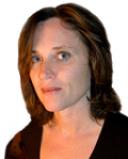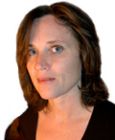
Depression
David: Desperately Seeking Documentation--(Response to Orli Van Mourik's "Quirky Minds: Hypergraphia: River of Words")
A million cameras won't hold all there is to lose.
Posted February 12, 2010
In "Quirky Minds: Hypergraphia: River of Words", Orli Van Mourik uses David Craig Welch as a case study to illustrate hypergraphia, the overflowing of words. She poses the insightful question, "is hypergraphia a blessing or a curse?" This was a question I asked myself in December of 2007 when David invited me, along with the artist Rosemary Covey, to film and write about him as he underwent his second brain surgery in three years on a lemon-sized brain tumor. The essay that follows (originally published on Word Riot is my answer which can never be definitive:
December 22nd I get this proposition. He's bright, successful, and these days I don't get propositioned all that...ever. The guy-David Craig Welch-wants me to leave my family, come to NYC with him over Christmas and film him having brain surgery. A retired entrepreneur, David "pitches" the occasion as a cross between a "really cool road trip" and an artistic imperative.
Rosemary Covey and David Craig Welch by KS
Award-winning wood-engraver Rosemary Covey will be there. After his first surgery, David commissioned Covey to "break through the glass ceiling of words" he kept hitting in his blog. Rosemary's sharp-cut prints hint at the dangerous pleasures of enmeshment. She's an ambitious person who nonetheless builds nests inside her loved ones. Both her themes and her presence strike me deeply. Last year, the artist agreed to let me document her relationships with her models. These are dramatic stories-Rosemary and the sadomasochists; Rosemary and the girl who died suddenly-but they've already happened. Rosemary's relationship with a brain cancer patient doesn't promise to unite me with my edge, but it's happening NOW-a point in favor of the trip that David hammers home, "You can get my guts, my gore, shoot me naked. I don't care."
I've met David several times. He's a guy who if he likes you he'll introduce you as Kickass. Kickass artist, kickass Documentary Film Producer. He knows exactly what he wants, which is for everyone to document his brain cancer. David's single-minded conviction is an antioxidant to my own scattered focus-a condition that's worsened since I've had kids. Independent filmmakers don't get paid for trips but David tells me this is "a once in a life time opportunity to raise awareness of brain cancer." I hear "once in a lifetime opportunity to prove I'm a kickass documentarian" and I call my camera guy. When he tells me he has plans, as in Christmas, I begin looking for his substitute.
My husband, patron of my arts, says, "Do what you have to do," a statement our children interpret as, "you have to stay with us." Doing my best to be all things, I travel with my family on the 24th to my mother-in-law's in Florida. When I explain to "Nanny" that I'll be leaving our Christmas vacation early, my five year-old pulls out the stops. "Mommy and David sitting in a tree...."; little brother joins her. Watching her grandchildren switch their hips, insinuating, Nanny sadly shakes her head. I won't be shamed though. At 4:00 AM on the 26th, I kiss my little angels without waking them. "Good luck," my husband whispers. We hug. I'm on my way.
The morning of the 27th, I'm in a tiny prep-room at NYU's med center where in three hours David will have brain surgery "on an eloquent part of the brain." Host with the Most David introduces "his" kickass artists to his kickass doctors. He distributes visual opportunities like appetizers. Meanwhile, the guests are documenting. David's mother, Susan, writes down the doctors' words. Mark, hired online for $500, is backed against a wall, filming; Rosemary, backed against another wall, sketches. I'm sitting on spare cameras piled on David's cot-theoretically directing from off-camera. David's dad, Jim, hides from us.
David with brain scanners by Rosemary Covey
Between poses for the camera, David obsesses about his cancer blog, 38 lemon. It wins awards ...and overwhelms. David will change a doctor's appointment without calling anyone. When Jim doesn't show up to drive him, David calls him. "Come on, Dad, don't you read my blog?!"
David begins grilling his mother about logging on for him tonight. "Do you know how to access Starbuck's WiFi? ‘Cuz I'm concerned." Nighty-clad, cameras sprouting from his head, he's calling uncles for backup for the blog.
I don't want my voice on film, but I can't help observing: "David, I see it FEELS very important to you that your mother log on tonight." David stiffens. "It doesn't FEEL important. It IS important. If I don't log on they'll think I'm dead."
David's dad sighs sharply. "He's always crying about me," David laughs; he identifies more with his mom's detachment. Now I'm thinking, so, Jim cries? Sure, David's surgeon, Dr. Kelly, known to be the best, has promised not to compromise David's quality of life, but no one is denying there are risks. Slowed speech, an awkward gait, may be acceptable in the abstract-but when it's someone you love-well, who can quantify? Jim is the only one in the room visibly distraught over the fact that his son's brain will be under the knife at 3:00 PM. He's got artists sketching, filming, writing down each shade of his fear-but no one here with whom to share it.
Logistics of his blog post aside, David himself is feeling fine. Doing a strip tease into his surgery gown, he jokes with the camera guy, "You getting this?" and with me, "My god, she's blushing." But then David's gone in a flurry of blown kisses and we're left in the public waiting room, five near strangers. In the absence of David the cheerful, overbearing host, another David looms: David the patient-vulnerable. His absence and its implications impact each of us. When she isn't sketching, Rosemary flutters, helplessly worrying about everyone else. Mark, a biting intellectual becomes a nice guy who likes movies. Susan strikes out with anecdotes, almost too witty for the stunned rest of us. Jim fogs over. And I turn heavy, slow.
We were told up front we couldn't film the surgery. No one argues with this. I'd acquiesced when they told us to stop filming in the public waiting room, but now Rosemary, Mark, and Susan point out that this is where the doctors announce surgery results. This announcement will be a quintessential David moment, one he'd expect to see on film. My film is about Rosemary's relationships, not brain cancer, but with the others' eyes on me, I need to prove myself. Calling the hospital administrators, I launch a fight for increased clearance, for a "once in a lifetime opportunity to raise awareness of brain cancer!" Inside I'm crumbling; (that, I can't forget). I tape myself, however, and on tape, I sound authoritative, upbeat. Almost like David.
After all my efforts, Dr. Kelly calls David's parents to a private meeting to give them the results. They emerge sobered. A new mass lurks, but for now David rests stable. Dr. Kelly isn't happy though. Susan, David's mother, slices the air with words for that hospital administrator who called Dr. Kelly during surgery to get extra clearance for my film. For now she checks the anger she likely feels towards me. I'm her son's guest; his surgery went OK.
But if it hadn't? Seeing Jim's sad face, I say, "I feel disgusting."
I want to tell David's parents, "I'm a parent too, I understand," but the truth stops me. If I were David's parent I wouldn't want me here.
That night we film as Rosemary, flushing, recounts a tale of sacrifice, valor, and desire: Susan gave up her spot in ICU so Rosemary could photograph David. A nurse tried to throw Rosemary out; the artist prevailed. Meanwhile, David came to consciousness, rasping, "I want photographs." Abruptly, I decide this ends my filming here. I pretend I'm being single-minded, focused on my Rosemary-relationships theme. "Let David keep his guts and gore." But I'm confused. I look guilty of coercing hospital administrators, but I feel guilty of being coerced. Twins, Ambition and Fear have been driving me. And I'm not even sure they're all mine.
David by Rosemary Covey
Next morning, I stop in Recovery to say goodbye to David. He's spelling his nurses' last names; he's still got it. Then he sees me without my camera guy or even Kodak. Pointing to his catheter, to the tube draining stuff from his brain, he starts shouting, "you're missing this!"
"David, I say, direct for once, "I'm right here. I see."
And I do, in David's eyes. He's not persuading or flattering anyone, not proving anything. He's living with brain cancer. This takes everything he's got.
I cry, while David stares. When did he draw me to him? He smoothes my hair. I feel tiny bones in his chest.
Those virtual lives that we create through our films, our art, our blogs? They are worth kicking ass for. They spark empathy, share our loss. But here is David's heartbeat. And I'm sorry, David, I just don't FEEL it. It's a fact.
A million blogs, a million cameras won't hold all there is to lose.
[After this surgery in 2007, David continued to press for documentation. In emails to me, Rosemary, and the dancer Meisha Bosma, he'd announce the discovery of another tumor, only to proclaim, "Let new art begin!" In March 2008, David won the James Elkin Humanitarian award for 38 lemon. By October 2008, however, his entries began fragmenting. In November 2008, David's brother logged on to explain that David had written his final words, "Face reality; confront end." David died in January 2009]






